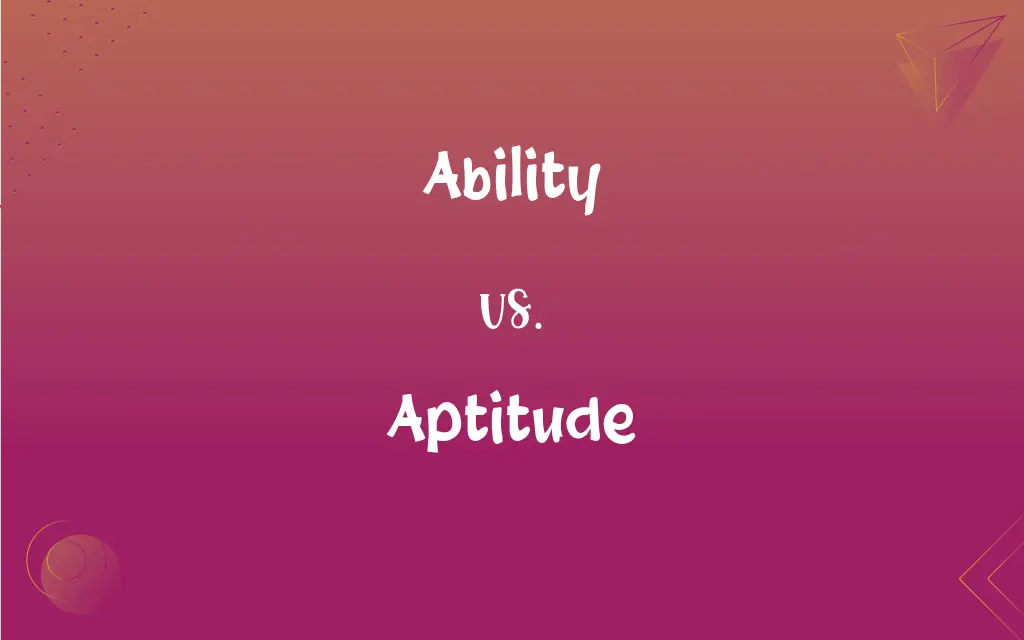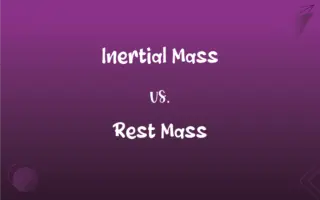Ability vs. Aptitude: What's the Difference?
Edited by Janet White || By Harlon Moss || Published on December 15, 2023
Ability refers to acquired skills and knowledge, whereas aptitude is a natural talent or potential for learning.

Key Differences
Ability is the skill or proficiency developed through practice and learning. Aptitude, in contrast, is an inherent or natural talent, indicating the potential to develop a skill.
While ability is often visible through performance, aptitude might not be immediately apparent. Ability is the realization of aptitude through training and experience.
Abilities are often specific and can be measured, such as the ability to play an instrument. Aptitude, however, is more about potential, like having a musical aptitude without yet knowing how to play.
One can have the ability to do something without an inherent aptitude for it, achieved through hard work and dedication. Conversely, one can have an aptitude for something but not yet developed the ability.
The development of abilities can be influenced by aptitudes; someone with a natural aptitude for a task will likely find it easier to develop the ability in that area.
ADVERTISEMENT
Comparison Chart
Nature
Acquired skill
Inherent talent
Visibility
Demonstrable through performance
Potential, not always visible
Measurement
Specific and quantifiable
More abstract, potential-based
Development
Achieved through practice and learning
Natural, can be enhanced by experience
Relation to Performance
Directly linked to performance
Indicates potential for future performance
ADVERTISEMENT
Ability and Aptitude Definitions
Ability
Proficiency acquired through practice.
His ability to play the piano improved with practice.
Aptitude
Natural talent or inclination.
She showed an aptitude for science at an early age.
Ability
Competence demonstrated by performance.
The athlete's physical ability is exceptional.
Aptitude
Potential to develop a skill.
Her artistic aptitude was evident in her early sketches.
Ability
Capability resulting from knowledge.
His technical ability makes him a valuable team member.
Aptitude
Propensity towards a certain skill.
He has an aptitude for solving puzzles.
Ability
Capacity to perform a task.
She has the ability to solve complex math problems.
Aptitude
Inherent ability to learn quickly.
His aptitude for languages enabled him to become fluent in Spanish rapidly.
Ability
Skill in a specific area.
Her linguistic abilities are impressive.
Aptitude
Innate capability or talent.
Her aptitude in mathematics made her a top student.
Ability
The quality of being able to do something, especially the physical, mental, financial, or legal power to accomplish something.
Aptitude
An inherent ability, as for learning; a talent
An aptitude for mathematics.
Ability
A skill, talent, or capacity
A student of many abilities.
Aptitude
(Archaic) The condition or quality of being suitable; appropriateness.
Ability
The quality of being suitable for or receptive to a specified treatment
The ability of a computer to be configured for use as a file server. See Usage Note at able.
Aptitude
Natural ability to acquire knowledge or skill.
Ability
(obsolete) Suitableness.
Aptitude
The condition of being suitable.
Ability
(uncountable) The quality or state of being able; capacity to do or of doing something; having the necessary power.
This phone has the ability to have its software upgraded wirelessly.
This wood has the ability to fight off insects, fungus, and mold for a considerable time.
Aptitude
A natural or acquired disposition or capacity for a particular purpose, or tendency to a particular action or effect; as, oil has an aptitude to burn.
He seems to have had a peculiar aptitude for the management of irregular troops.
Ability
The legal wherewithal to act.
Aptitude
A general fitness or suitableness; adaptation.
That sociable and helpful aptitude which God implanted between man and woman.
Ability
Physical power.
Aptitude
Readiness in learning; docility; aptness.
He was a boy of remarkable aptitude.
Ability
(archaic) Financial ability.
Aptitude
Inherent ability
Ability
(uncountable) A unique power of the mind; a faculty.
Ability
(countable) A skill or competence in doing; mental power; talent; aptitude.
They are persons of ability, who will go far in life.
She has an uncanny ability to defuse conflict.
A mixed-ability class
Ability
The quality or state of being able; power to perform, whether physical, moral, intellectual, conventional, or legal; capacity; skill or competence in doing; sufficiency of strength, skill, resources, etc.; - in the plural, faculty, talent.
Then the disciples, every man according to his ability, determined to send relief unto the brethren.
Natural abilities are like natural plants, that need pruning by study.
The public men of England, with much of a peculiar kind of ability.
Ability
The quality of being able to perform; a quality that permits or facilitates achievement or accomplishment
Ability
Possession of the qualities (especially mental qualities) required to do something or get something done;
Danger heightened his powers of discrimination
FAQs
How do you measure ability?
Ability is measured by proficiency and performance in a specific area.
What is ability?
It's the skill or competence in a specific area, often developed through practice.
Is ability the same as talent?
No, ability is often developed, whereas talent is usually a natural gift or aptitude.
Can abilities change over time?
Yes, abilities can improve or diminish based on practice and usage.
Can ability be learned?
Yes, abilities can be developed and improved over time through learning and practice.
Can aptitude be developed?
Aptitude itself is inherent, but it can be realized or enhanced through learning and practice.
Is aptitude always visible?
No, sometimes aptitude is a hidden potential that becomes apparent through exposure or training.
Are abilities limited to certain areas?
Abilities can be in any area, ranging from physical to cognitive skills.
Can someone have an aptitude but not an ability in the same area?
Yes, one can have a natural aptitude for something but may not have developed the ability yet.
Is aptitude genetic?
Aptitude can be influenced by genetics, but environmental factors also play a significant role.
How does one identify their aptitudes?
Through trying different activities and observing ease of learning and performance.
Are all abilities valuable?
Value of abilities depends on context and application; some may be more relevant in certain situations than others.
What is aptitude?
Aptitude is a natural talent or potential, indicating a propensity for learning or performing in a certain area.
How does aptitude differ from interest?
Aptitude is a natural talent, while interest is a preference or liking for something.
Do abilities define a person?
Abilities are part of a person's skillset, but they don't entirely define who they are.
Is it possible to have an aptitude but no interest in that area?
Yes, one can have a natural talent in an area but may not have an interest in pursuing it.
Can abilities be lost?
Yes, if not practiced or maintained, abilities can diminish over time.
Can aptitude be misleading?
Sometimes, as it's potential, not a guarantee of success or skill.
Can someone have multiple aptitudes?
Yes, it's possible to have natural talents in several areas.
How important is aptitude in learning?
Aptitude can make learning easier in certain areas, but it's not the only factor in success.
About Author
Written by
Harlon MossHarlon is a seasoned quality moderator and accomplished content writer for Difference Wiki. An alumnus of the prestigious University of California, he earned his degree in Computer Science. Leveraging his academic background, Harlon brings a meticulous and informed perspective to his work, ensuring content accuracy and excellence.
Edited by
Janet WhiteJanet White has been an esteemed writer and blogger for Difference Wiki. Holding a Master's degree in Science and Medical Journalism from the prestigious Boston University, she has consistently demonstrated her expertise and passion for her field. When she's not immersed in her work, Janet relishes her time exercising, delving into a good book, and cherishing moments with friends and family.






































































